Will the Next Governor Prioritize Black Mississippians’ Needs?

[ad_1]
Mississippi has a 38% population of African Americans, which is the highest percentage of any state in the nation. Agriculture and forestry are its top economic industries, making it a top producer of farm-raised catfish, sweet potatoes, cotton and pulpwood. However, systemic racist policies and practices continue to bedevil Mississippi and are deeply ingrained in every facet of society: housing and banking access, education, criminal justice, policing, clean water, health-care, environmental hazards, farming, food security and more.
As Mississippians prepare to go to the polls on Nov. 07, 2023, to either re-elect the incumbent Republican Gov. Tate Reeves for a second term in office or elect his successor, I have one question: Will the next Mississippi governor prioritize the needs of Black Mississippians?
Tackling Poverty and Educational Disparities
Poverty disproportionately affects African Americans in Mississippi. Despite being the 32nd largest and 35th most populous state in the United States, Mississippi has the lowest per capita income in the country and frequently ranks high in poverty, with Black Mississippians having almost three times the poverty rate of the state’s white residents. For example, the effects of poverty are continually being felt in Jackson, the state capital and the most populous city of more than 150,000.
People, mainly whites, began to leave the city after the integration of public schools starting in 1970 and continuing over the decades since then. As a result, state leaders have refused to develop in much of Jackson, which is home to more than one-fifth of the population of Mississippi, forcing more residents to abandon the city, decreasing from a population of 173,514 in 2010 to 153,701 in 2020. This further shrank the tax base and left more people, especially Black Jacksonians, with fewer opportunities and the capital city with less revenue.

Education is another major issue affecting Black Mississippians, leaving some schools in deplorable condition as the government continues to operate two types of schools. “At Raines Elementary, which is more than 99 percent African American, the paint is peeling off the walls, water spots are visible on the ceilings, and lunches sometimes have curdled milk and rotten fruit,” the Southern Poverty Law Center wrote in 2017, a nonprofit legal advocacy organization that specializes in civil rights and public interest litigation, wrote about the Jackson school.
Raines Elementary, once described as “old, dark, and gloomy—like a jail,” paints the picture of most schools in Mississippi with a predominantly Black student population: They lack experienced teachers, basic supplies, textbooks, tutoring programs, literature sports, and other extracurricular activities, and sometimes even toilet paper.
“Today, 80 percent of Mississippi’s highest-performing school districts are majority white, and all of its failing school districts are majority Black,” the SPLC continued, as Mississippi continues to operate two types of schools—high-performing schools for white children and failing schools for Black children—more than 100 years after white people violently ended Reconstruction and 66 years after Brown v. Board inspired the Mississippi Legislature to offer tax money, or vouchers, to white parents to move their kids to segregation academies. However, Black residents cannot sue to force the state to give the same quality of education and opportunities to their children as to the children in predominantly white schools.
White and Black leaders in Mississippi often argue that the only way out of poverty is through education. But that is much easier said than done, especially among white leaders who perpetuate themselves in power and implement racist policies to hold Black Mississippians down, preventing them from realizing their full potential.

For example, Reeves failed to significantly boost funding for education and supported additional bonus pay to reward teachers in higher-performing schools when he was lieutenant governor, presiding as president of the Mississippi Senate. As governor, Reeves is often criticized for his support of “school choice” policies to open charter schools instead of saving the state’s underfunded public schools. He also supported millions of dollars from the public education fund to be used as vouchers for private school special-needs tuition.
It is evident that the current political, economic and educational landscape is not encouraging for the Black community. Systemic poverty continues to unequally affect African Americans in Mississippi, and educational disparities continue to exist as Black students remain significantly behind their white peers in literacy, mathematics and science proficiency. This is why it’s imperative for voters to consider these factors when selecting their choice for the state’s next governor.
The gubernatorial candidate’s platform should openly commit to tackling poverty and improving educational opportunities for Black students, while also striving to ensure that all citizens have equal access to high-quality health care, job opportunities and housing. The next governor must also recognize that racial justice and equality cannot be achieved without recognizing the importance of cultural and religious identity for African Americans.
This MFP Voices essay does not necessarily represent the views of the Mississippi Journalism and Education Group, the Mississippi Free Press, its staff or board members. To submit an opinion for the MFP Voices section, send up to 1,200 words and sources fact-checking the included information to [email protected] We welcome a wide variety of viewpoints.
[ad_2]
Source link
